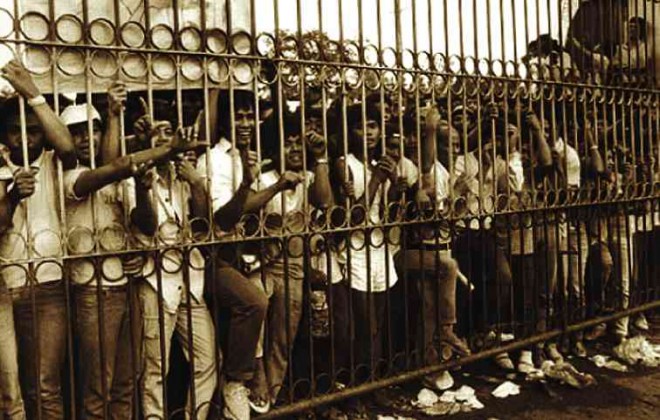Victims recall sexual violence in detention

REAL HEROES The people forming human barricades flash the “Laban” sign as they stand at the gate of Camp Crame. FILE PHOTO
BEARING the stigma of rape, Aida Santos took almost 10 years to share with her husband, a comrade in the underground movement, the sexual violence she suffered in detention during the Marcos dictatorship.
“[The officer] came into my room with a gun and raped me. I could not fight back,” Santos said, recalling how the officer had psychologically tortured her before raping her. She was only 24 then.
“I was already a broken person,” said Santos, among the women activists who stood up against martial law.
On Wednesday, in Quezon City, they read aloud their personal stories compiled in a book, “Women Against Marcos: Stories of Filipino and Filipino American Women who Fought a Dictator.”
The gathering was one of the events marking the 30th anniversary of the Edsa People Power Revolution that toppled the Marcos regime.
Article continues after this advertisementShould not happen again
Article continues after this advertisement“Doing this kind of reading does not just help the audience understand. It also helps the women themselves sort through their
experiences to heal,” a San Francisco-based author, Mila de Guzman, said in an interview.
“And we hope people understand. This is something that should never happen again. We can never have another dictatorship,” said De Guzman, also an Inquirer US bureau correspondent.
A collective expression of disgust filled the Sikat Venue as Bonifacio Ilagan, spokesperson of the Campaign Against the Return of the Marcoses to Malacañang (Carmma),
noted the high survey ratings of the dictator’s son, Sen. Ferdinand “Bongbong” Marcos Jr., who is seeking the vice presidency.
Timely reminder
According to Ilagan, the book is a timely reminder to educate the millennials who now make up 20 million of the country’s 54.4 million voters and who have not experienced the atrocities of martial law under then President Ferdinand Marcos.
“Many were gang-raped, while others were subjected to water cure or electric shock before being sexually abused,” said Santos, who has since devoted her time to working for the human rights of Filipino women.
The book also features the “largely unacknowledged” participation of Filipino American women in the antidictatorship movement, reflected in the stories of Geline Avila and Cindy Domingo, who joined the Union of Democratic Filipinos (KDP) in the United States.
Agony of recollection
Domingo spoke of her pursuit of justice for the assassination in Seattle of her brother, Silme Domingo, and a comrade, Gene Viernes, union leaders and anti-Marcos activists.
The stories of activism of Mila Aguilar, Aurora “Oyie” Javate de Dios and Sr. Mary John Mananzan were also included in the book, as well as the author’s own journey and her sister Violeta’s letters from the underground.
“While I executed the first and final drafts, the women became actively involved in the editing of their narratives and some wrote significant parts of their stories,” De Guzman explained in the prologue.
“The process was not always easy, as the women at times agonized over recalling their difficult experiences and those of their comrades at the hands of the Marcos regime,” De Guzman said.
Not just 4 days
Wednesday’s gathering, a part of a series of activities to disseminate the women’s stories, was sponsored by Carmma, Linangan ng Kulturang Pilipino and the Concerned Artists of the Philippines.
The book was published by Carayan Press in San Francisco and De Guzman is currently looking for a Philippine publisher for a more affordable local distribution.
“We want people to know that there was a nationwide movement to fight the dictator. People power did not just happen in four days. Even before martial law, there were a lot of students and sectors in the Philippines that opposed the Marcos repression,” De Guzman said.
“We should also be proud as Filipinos that we did not take this lying down,” she said.